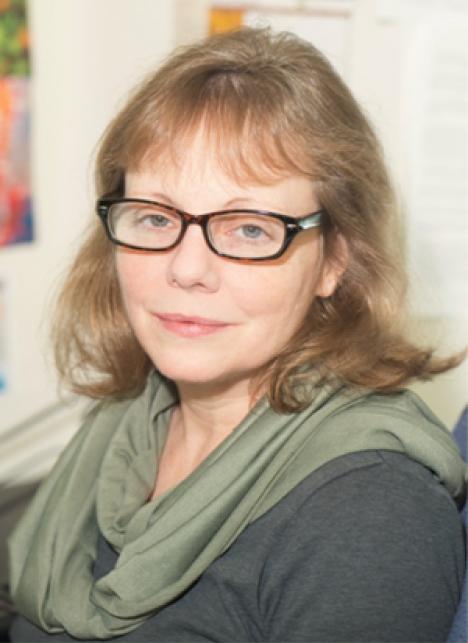Diana Murray, Ph.D., is a CSBC Investigator and the Outreach Core Leader at the Center for Cancer Systems Therapeutics (CaST) of Columbia University.
Along with computational biology investigations, Dr. Murray helps public school and post-baccalaureate students learn about career paths in basic research. She wants to give young people the chance to experience scientific studies in a multi-disciplinary field that integrates diverse interests.
She likes studying science and riding a motorcycle for similar reasons: “Both tasks are challenging and require deep concentration.”
In this interview, she discusses her career journey, her research related to cancer systems biology, and the CSBC CaST outreach programs.
Can you describe your career path?
Studying at SUNY Stony Brook as an undergraduate was transformative. I chose to study physics because I found it difficult and quickly became fascinated with particles. My mentor encouraged me to continue with graduate studies, which wasn’t something I had envisioned for myself.
After defending my thesis in physics, I enjoyed working at a company where I used statistical learning to predict stock market returns and promotion-related changes in product sales. I became interested in bridging physics and biology after a colleague at Brookhaven National Laboratory told me about the Protein Data Bank. I returned to SUNY Stony Brook as a postdoctoral fellow in computational biophysics and became hooked on biological research.
Eventually, I joined the Department of Systems Biology at Columbia as a Research Scientist and the Program Director of Research. When I volunteered to lead the outreach efforts of the Columbia CSBC, the latter title was expanded to include Outreach.
How do you approach mentorship?
I have always felt at home in science, in part, because I had supportive mentors who provided encouragement and guidance. They also gave me plenty of independence. I value my efforts in scientific outreach because I appreciate what a difference a good mentor can make in a young student’s experiences and decisions.
Why is systems biology important for cancer research?
Cancer is a multifactorial disease. Systems methods integrate genomics, proteomics, and metabolomics data, which provides a more holistic understanding of cancer processes in unprecedented detail. We strive to translate information about the complex mechanisms involved in cancer into new treatments.
How does the PrePPI computational model developed by your lab contribute to cancer systems biology?
An important aspect of a protein’s function is how it interacts with other proteins. We focus on leveraging information in the Protein Data Bank to predict and build structural models of protein-protein interactions. The PrePPI database contains physical interaction models and provides a comprehensive perspective of the human protein interactome. Thus, PrePPI serves as a rich resource for exploring protein function.
Our models provide mechanistic explanations and testable hypotheses for cellular signaling and its dysregulation in cancer.
Why do you think outreach is important for the field of cancer systems biology?
Columbia University Medical Center mainly educates graduate students, medical students, and postdoctoral fellows. However, if we want to nurture and recruit future generations of cancer systems biologists, we need to reach students when they are young. I believe it is especially important to give public middle-school students a sense of what is happening in systems biology and how their studies are related to this field.
Can you describe your CSBC outreach initiative, the CaST Scholars program, which gives post-baccalaureates an opportunity to train in cancer systems biology?
By talking with people at conferences, I learned there is a great need for post-baccalaureate internships and mentoring. Our goal is to offer a broad range of activities to students who are at a key decision point in their career trajectory. For example, we provide GRE test preparation courses to help students who want to apply to graduate school.
We are having great success through our partnership with CUNY Brooklyn College. A group of eight students comprises our first cohort of CaST Scholars, and they are very enthusiastic and involved.
For example, we had funds to support 4-month internships for two students, one of whom was subsequently hired as a research associate. She is excelling in this environment and has been working with a postdoctoral fellow and senior staff scientist. Her experience in the laboratory is helping her develop scientific research skills and giving her the opportunity to learn about careers in cancer systems biology.
Along with the CaST Scholars, we also started DREAM-High, which is a program that gives high school students the opportunity to visualize and analyze cancer data.
It’s definitely worth the investment to develop relationships with students and encourage their interest in scientific research.
